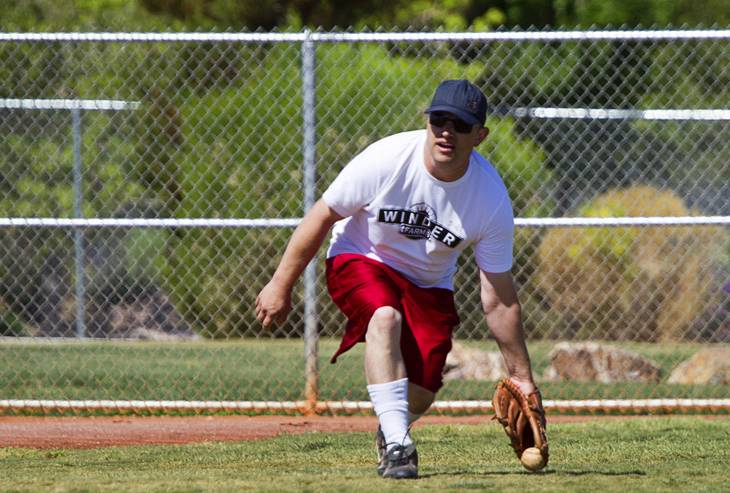Many weekend mornings, Sean McCrady can be found at a local ballfield in the company of a well-worn Louisville Slugger and a ragtag collection of recreational ballplayers, an amateur and enthusiastic group of McCrady’s co-workers at grocery delivery company Winder Farms.
Sure, these informal baseball games are an energetic way to kill weekend time. But for McCrady — Winder Farms’ regional sales director for Las Vegas, where 45 of the company’s 300 employees are based — they also are a form of spring training and a way to get in tip-top shape for the Ragnar Relay Series, a grueling 200-mile, 24-hour relay race that combines fitness, endurance, teamwork and a whole lot of perspiration.
McCrady, who has been with Winder for 16 years, has run the Ragnar race 12 times since 2006 — eight in Utah and four in Las Vegas — and is gearing up for the Wasatch Back relay in June as well as the Las Vegas Ragnar this fall.
Best of all, McCrady has never ponied up a single dime to participate.
In keeping with its health-conscious corporate culture, Winder picks up the tab for the 12-person teams — which include novice joggers and elite runners — to the tune of $1,500 in Utah and $1,380 locally, and that’s just the registration fee.
“It’s great that a company our size is willing to pay 100 percent of the cost — including meals, transportation and hotel rooms — as a way for employees to stay active and healthy and encourage those types of lifestyles,” said McCrady, who also takes advantage of the discounted rate Winder offers employees on its grocery-delivery service.
Promoting physical fitness is just one way companies of all sizes are investing in the health of their employees, as corporate wellness programs have grown legs and demonstrated a proven track record of success. Whether it’s workplace Weight Watchers programs, intramural softball teams, onsite health coaches, nutrition counselors or biometric screenings to determine risk factors, companies are taking a proactive, holistic approach to employee health.
It’s great news for employees, but what’s in it for employers?
“The No. 1 benefit is a reduction in health care costs,” said Don Powell, president and CEO of the Farmington Hills, Mich.-based American Institute for Preventive Medicine. Wellness programs can lower absenteeism, improve productivity and increase morale, particularly when employees are educated regarding medical self-care, or recognizing which symptoms are serious and which can be treated at home.
Powell said medical self-care can teach employees to be better consumers of health care services.
“Twenty-five percent of doctor visits have been deemed unnecessary, costing an employer $199 per visit, while 55 percent of emergency room visits are unnecessary, costing $1,349 per visit nationally,” Powell said.
Although studies vary, Powell estimated that a cohesive workplace wellness program has an average savings of $3.82 for every $1 invested, with 78 percent of companies offering such programs, according to a 2011 study by the Kaiser Family Foundation.
Given that America doesn’t have the healthiest report card, it’s no wonder more companies are implementing healthy, preventive workplace practices. The U.S. Department of Health and Human Services reported in 2011 that a high number of U.S. employees have risk factors for disease. For every 100 U.S. employees, the following average number of workers have existing health issues and risks, the agency found:
• 34 are overweight
• 33 have high blood pressure
• 33 don’t exercise
• 31 drink alcohol to excess
• 25 have cardiovascular disease
• 21 smoke
• 15 have high cholesterol
• 11 are diabetic
Addressing such factors has become an important piece of company health care plans.
At Boyd Gaming, the company’s strategy over the past 10 years has been honed to create a “culture of health,” according to Bob Berglund, vice president for benefits and insurance.
Boyd — with 14,000 employees in eight states, including 9,000 in Las Vegas — began the strategy with health awareness days. Company health plans now include onsite health coaches and free confidential health screenings at all of its properties, as well as annual “Lose it to Win” weight-loss contests, all of which extend to covered spouses. Boyd also provides free 30-minute biometric health screenings at its casinos to measure body mass index, blood pressure, cholesterol, glucose and triglycerides.
Like many other companies, Boyd offers discounted health plan premiums to encourage wider use of company health and wellness programs.
“It’s been a home run for us,” said Berglund, adding that about 90 percent of employees take advantage of the incentive each year. “Yes, we are a publicly traded company with obligations to our shareholders, but on a higher level, treating employees with care and empathy is also integral to our corporate health.”
Slot manufacturer Bally Technologies has shifted its focus to wellness and prevention, which Kristen Nazario, the company’s senior director of human resources, said not only keeps health care costs down, but also bolsters employee morale.
The Las Vegas-based company — which has about 4,000 global employees, including 1,200 in Southern Nevada — provides onsite biometric screenings, Weight Watchers sessions, flu shots and mammograms. It also encourages physical fitness by sponsoring teams to participate in the local Corporate Challenge, as well as the national HealthyWage BMI Challenge for weight loss. Last year, the five-member team from Bally placed second, pocketing a $5,000 cash prize.
As for financial incentives, Las Vegas’ Nevada Corporate Headquarters, which employs just under 100 people and specializes in launching business startups and protecting their wealth, recently implemented a three-month weight-loss competition that will reward the top three winners with cash. The final weigh-in is at the end of May. The biggest loser will receive $1,000, second place $750 and third $500.
Participating employees also will earn one “Wow buck” — an internal incentive that can be redeemed for gift cards — for every pound lost.
“Employee health and wellness is not just a gimmick for us,” said Raymond Marin, vice president of corporate services for NCH.
The company also provides gym-membership reimbursement for employees who exercise twice a week or eight times a month.
Faiss Foley Warren Public Relations & Government, which has 16 employees, has a similar reimbursement policy.
“We’re located in the same building as the Southern Nevada Water Authority, which also has a 24-Hour Fitness,” said Senior Account Executive Adrienne Augustus, who often works up a sweat with her pal Marsha MacEachern, the agency’s social media and video director. “Short of having a treadmill next to my desk, it doesn’t get much easier than having your company pay for you to go downstairs and work out.”

